
Background information
Is Netflix doing away with series marathons?
by Luca Fontana

Streaming platforms offer a selection of thousands of series and movies – 24/7, in near-unlimited amounts. Netflix and Co. are influencing our viewing habits more than you might think.
Series are booming. At least that’s the case since streaming platforms including Netflix and Amazon Prime have wormed their way into our lives. Remember the days when there was that one series everybody watched once a week? And then discussed it at length the following day? Well, those days are over. And we have Netflix and Co. to thank for it.
Today, streaming providers churn out a seemingly endless number of series and movies and they’re all at our fingertips. If you feel like it, you can watch one episode after another. Weekend after weekend. A behavioural pattern that is more commonly known as «binge watching».
But what does this kind of behaviour do to us?
61 per cent of Netflix viewers regularly watch two to six episodes at a time. This is considered normal by the majority. What’s more, the numbers stated roughly correspond to what interviewees classified as binge watching. This is what a Netflix survey conducted back in 2013 showed. It also revealed that the term binge watching did not evoke negative associations in the interviewees. Reason enough for Netflix to declare binge watching the new norm.
Not that the streaming provider needs to explicitly ask its viewers to gain this kind of insight. After all, while we’re watching series and movies, Netflix is busy collecting data. The California-based company knows exactly how long we watch a series for and at which stage we give up on one. This allows Netflix to develop fine-tuned formats that will keep viewers glued to the box for even longer. Nonetheless, it goes without saying that it’s beneficial to the company if we reach the conclusion ourselves that it’s normal to binge watch.
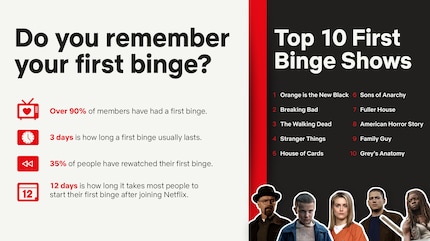
The only thing is, Netflix is turning it into a sport. «Binge racing» is what they call it. Binge racers are viewers who consume a full season within 24 hours after its release. Netflix says: «And before you assume that racers are just basement-dwelling couch potatoes, know that for these super fans, the speed of watching is an achievement to be proud of and brag about. TV is their passion and Binge Racing is their sport.»
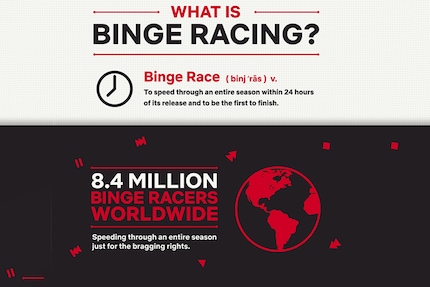
If you sugarcoat it like that, it doesn’t even sound that bad, does it? But things take a dark turn when you hear what Netflix CEO Reed Hastings has to say about the true competition of their streaming services. Contrary to what you might be thinking, the competitors aren’t other streamers. «Think about it,» says Hastings, «[...] we’re a competitor to HBO, and yet over 10 years we’ve grown to 50 million, and they’ve continued modestly growing. They haven’t shrunk. [...] when you watch a show from Netflix and you get addicted to it, you stay up late at night. [...] we’re competing with sleep, on the margin.»
So if it were up to Netflix, we should all be watching series as often and for as long as possible and reducing our sleep. Preferably not sleeping at all.
Many of us probably feel the same way: If it weren’t for the strict scheduling of providers, i.e. releasing episodes one at a time, we’d all go into a frenzy. Netflix is fully aware of this.
«Our viewing data shows that the majority of streamers would actually prefer to have a whole season of a show available to watch at their own pace,» says Ted Sarandos, Chief Content Officer of Netflix. When he speaks of viewers’ own pace, he also means 46 per cent of couples who are watching a series together but cheat on each other by continuing to watch without the other half noticing. Don’t say I didn’t warn you.
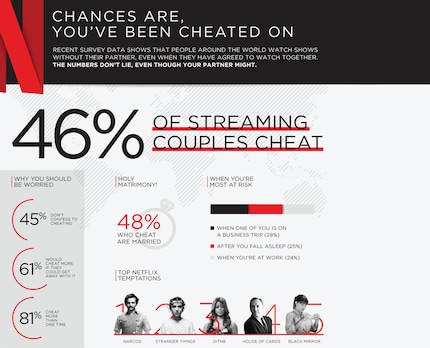
Sarandos even goes a step further: «Netflix has [...] helped free consumers from the limitations of linear television. Our own original series are created for multi-episodic viewing.» This means that every episode has a cliffhanger ending – an ending that will keep you glued to the screen.
The next episode starts automatically as soon as the previous one has ended. Netflix introduced this feature about six years ago (thanks for pointing that out @Facebook comments!). It definitely encourages binge watching – precisely what the streaming provider wants. Unless you stop the 20-second countdown leading up to the next episode, that is. But in reality, you’ll probably only reach for the remote to skip the countdown. Not to stop it. Of course, Netflix knows this.

What’s more alarming is the effect the end of a season has on viewers. In an article published in 2015, Matthew Schneier, a New York Times journalist, wrote about the looming end of «Master of None»: «I felt anxious, wistful, bereft in advance. [...] Once finished, there’d be no more until the next season– if there was a next season, which has still not been officially announced.»
He even comes up with a new term for his condition: Post-Netflix binge depression.
But worry not, streaming providers have a great antidote for it: more series and movies. An algorithm will present you with a customised preselection. A preselection that comes with trailers that start automatically. Of course they do. For the preselection, Netflix compares the database with the series you’ve just finished and your usual viewing habits and watch lists. Netflix, Prime and Co. know exactly which movies are watched most after the series you just binge watched.
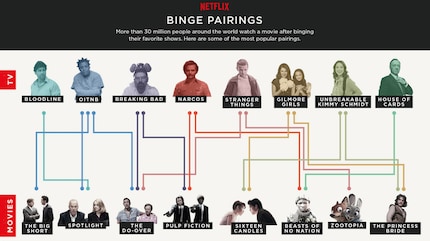
That’s how providers spin a web of series and movies that seem to fit our taste to a T. This sparks our curiosity. One episode, two episodes, three... Streaming providers are fully aware that it usually takes two to three episodes for the viewer to decide to keep on watching or not. That’s why an unexpected plot twist usually takes place in episode three. Once you’ve reached that threshold, chances are, you’re hooked and will remain in the cycle.
«The captive audience is gone. If you give people this opportunity to mainline all in one day, there's reason to believe they will do it,» says director and producer David Fincher shortly after the release of «House of Cards» – Netflix’s first in-house production.
At the time, Netflix was the first streaming provider to not only produce their own series – referred to as Netflix originals – but to release all episodes of a season at the same time. This is exactly what Ted Sarandos meant by «Freeing consumers from the limitations of linear television».
It also marked the beginning of binge watching.

Binge watching series has got us used to two things movies struggle to replicate:
While watching series, we spend so much time with these characters each season that we grow really fond of them. So much so we feel we know them better than certain people we see at work every day. And when a season comes to an end, we feel abandoned by these characters. That’s why we talk about it. About those past events, for example. Or possible future developments. Until the next season starts. Unlike movies, series don’t end after «The End».
Hollywood is trying to copy this effect. And Hollywood is pretty good at it. «Marvel Cinematic Universe» is nothing other than a series in a cinema format. Come June 2019, the Universe will consist of 23 movies. Other examples are «Star Wars» or «The Wizarding World of Harry Potter». And this formula works, as the ten highest-grossing movies of last year show.
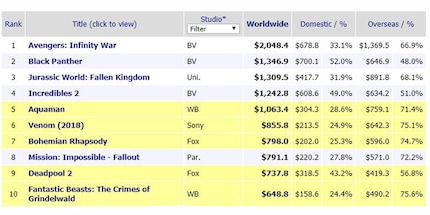
«Bohemian Rhapsody» was the only movie to hit the top 10 without having a sequel or being part of an existing movie franchise. All the other flicks did not tell a complete story in their own right. And those that did, drew from context taken from their prequels. That’s kind of what series do.
Series change our behaviour. Changes that range from drastic to dramatic. Personally, I find it difficult to watch a movie in one go if its runtime exceeds two hours. It makes me feel as if I’ve made a life-long commitment that’s bound to end in an unsatisfactory way. Unless I’m already familiar with the characters and storylines.
This begs the question if series and their creators were spawned in hell with the mission to make us all addicts?
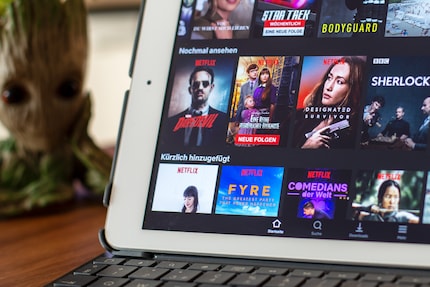
I struggle to come up with an answer. After all, addiction goes hand in hand with escapism. That feeling of immersing yourself in a familiar environment that lets you forget your grey, stressful reality for a while. Naturally, Netflix and the like take advantage of this. If it’s not series we’re using to remove ourselves from reality, we’ll find other means. Books. Comics. Movies. Or sports. We all need to vent, clear our heads and have a few hours a week during which we can leave our worries behind us for a bit.
And yes: I also love a good series and believe that I’m benefitting from the gigantic selection. However, what bothers me is that streaming providers are trying to push viewers’ behaviour beyond the limits of what’s healthy. For example, take Netflix’s statement on proclaiming that sleep is their nemesis. Or turning addictive behaviour into a sport by calling it Binge Racing.
«And for what? For a little bit of money,» says Marge Gunderson at the end of «Fargo».
I write about technology as if it were cinema, and about films as if they were real life. Between bits and blockbusters, I’m after stories that move people, not just generate clicks. And yes – sometimes I listen to film scores louder than I probably should.
Interesting facts about products, behind-the-scenes looks at manufacturers and deep-dives on interesting people.
Show all